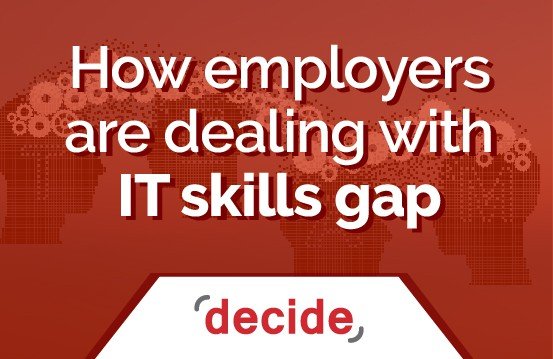 According to predictions based upon information from the Bureau of Labor Statistics, the United States will face a deficit of one million people to fill skilled computing jobs by 2020. Only a small fraction of employers say that higher education sufficiently prepares students for jobs in their organizations; Beyond that, for 600,000 current openings for IT jobs, only a little over 40,000 computer science majors graduated last year. Not only does the IT skills gap exist, it’s likely to continue to exist in the next few years. Companies that can effectively deal with this challenge will continue to benefit from tech; however, businesses that struggle with it may find themselves left behind.
According to predictions based upon information from the Bureau of Labor Statistics, the United States will face a deficit of one million people to fill skilled computing jobs by 2020. Only a small fraction of employers say that higher education sufficiently prepares students for jobs in their organizations; Beyond that, for 600,000 current openings for IT jobs, only a little over 40,000 computer science majors graduated last year. Not only does the IT skills gap exist, it’s likely to continue to exist in the next few years. Companies that can effectively deal with this challenge will continue to benefit from tech; however, businesses that struggle with it may find themselves left behind.
How Can Companies Prepare for an IT Skills Gap?
Of course, the demand for various skills varies quite a bit. CIO Magazine reported that the most in-demand skills include data scientists and analysts, security administrators, database developers, and network and system administrators. In addition, some corporations face a shortage of developers for evolving technologies like blockchain and AI.
To hire talent, companies have to compete with other businesses within their own industries, tech firms, and academia. Competition with academia may mean that the skills gap will also generate a shortage of teachers for the next crop of tech professionals.
Tech Talent Tends Gravitate Towards Companies That Regard Technology as an Investment
To attract and retain top tech talent, it turns out that some companies have found better ways to compete than only relying upon high salaries and expensive perks. Businesses also attract talented information technology people by establishing a reputation as a company that considers technology an investment in their future and not just an expense.
These two tactics can help companies demonstrate that they truly invest in technology and technical knowledge:
- Develop current employees: Research has found that almost three-quarters of talented tech people want to work for companies that offer plenty of training and financial incentives for completing this training. They also say they will eventually leave an employer if they aren’t satisfied with development opportunities. Since current employees have already demonstrated some measure of loyalty, it only makes sense to invest in development. Training opportunities can groom talent from within the company and help with retention. They also allow companies to offer lower salaries with the promise of future raises after completing training.
- Make tech-friendly changes to company culture: Seven out of tech talent say that they would prefer to work in a more entrepreneurial culture. They want flexibility in their work schedules and a chance to flex innovative muscles. Even old and established corporations may have a better chance to attract good IT people if they update their culture to match the expectations of younger workers.Businesses should strive to brand themselves as a prestigious and tech-friendly place to work.
Efforts to invest in technology help retain and attract people with the right skills, education, and aptitudes. Even if new-hires may lack every skill they require to perform at top levels, corporate development programs can fill in the gaps and help ensure loyalty.
For instance, companies found that they had to compete with universities for high-level AI developers and managers. Large corporations, like Google, learned that they could develop more new AI professionals and also attract some from educational institutions by setting up their own on-campus classes. Academics were attracted by a chance to spend some time teaching and some time flexing their own tech muscles; in addition, prospective AI developers knew they could get a chance to enjoy professional development.These sorts of programs make companies places that job seekers compete for positions for.
How Proactively Bridging the Skills Gap Helps Companies in Many Ways
In the end, efforts to emphasize technology as an investment can also benefit the overall company. Instead of regarding tech as merely an expensive chore, the businesses recruited people who worked harder to find and use tech that supported their employer’s business goals. They put their valuable skills to work to create more value for their companies. Just because the IT skills gap does impact so many companies and will continue to do so, businesses that learn to bridge that gap will enjoy a competitive advantage in many ways.
Decide Consulting provides IT staffing services. Our conclusive hiring methodology enables us to bring the best IT problem solvers to your organization. Our entire management team comes from an IT technical background giving us a unique perspective on candidates and the industry.